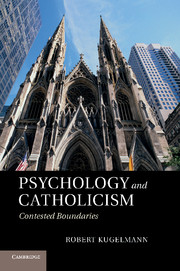Book contents
- Frontmatter
- Contents
- Acknowledgments
- 1 An introduction
- 2 The major fault line: modernism and psychology
- 3 Neoscholastic psychology
- 4 Psychology as the boundary: Catholicism, spiritualism, and science
- 5 Psychoanalysis versus the power of will
- 6 From out of the depths: Carl Jung's challenges and Catholic replies
- 7 Institutionalizing the relationship
- 8 Humanistic psychology and Catholicism: dialogue and confrontation
- 9 Trading zones between psychology and Catholicism
- 10 Crossings
- References
- Index
8 - Humanistic psychology and Catholicism: dialogue and confrontation
Published online by Cambridge University Press: 05 July 2011
- Frontmatter
- Contents
- Acknowledgments
- 1 An introduction
- 2 The major fault line: modernism and psychology
- 3 Neoscholastic psychology
- 4 Psychology as the boundary: Catholicism, spiritualism, and science
- 5 Psychoanalysis versus the power of will
- 6 From out of the depths: Carl Jung's challenges and Catholic replies
- 7 Institutionalizing the relationship
- 8 Humanistic psychology and Catholicism: dialogue and confrontation
- 9 Trading zones between psychology and Catholicism
- 10 Crossings
- References
- Index
Summary
We have seen that Neoscholastic psychology kept the philosophical questions of psychology alive. The philosophers and theologians and Church officials looking over the psychologist's shoulders contested the boundaries of psychology. But after World War II, a new social, political, economic, and ecclesiastical landscape began to take shape. The Second Vatican Council (1962–65) and the changes it wrought had an effect on psychology. The American Catholic Psychological Association (ACPA) responded to the changes by redefining itself and its objectives. In discussing that re-organization, and at the end of the chapter on psychoanalysis, I alluded to emerging interest in phenomenology and humanistic psychology. In this chapter, we turn to these two movements and how they provided a new opening for Catholic psychologists.
I will consider those psychologists who were at the intersection of what we can call the “Catholic questions” and humanistic psychology, beginning in the 1950s. I identify these psychologists primarily by their membership in the ACPA. By the “Catholic questions” I mean, on the one hand, those relating primarily to the nature of the human person, and on the other, those relating to how to treat persons, especially in psychotherapy. Those are the Catholic questions, because they were the ones that lay prominently on the boundary between the field of psychology and the domain of the Church.
A list of Catholic psychologists who contributed to humanistic psychology includes a number of members of the ACPA: Charles A. Curran (1945; 1952; 1954a and 1954b; 1969), Magda Arnold (1954a), Adrian van Kaam (1964), Raymond McCall (1975), Alden Fisher (1969), Frank T. Severin (1965; 1973), Henryk Misiak and Virginia Staudt Sexton (1973), Vytautas Bieliauskas (1974), James E. Royce (1964), André Godin (1952), Annette Walters (1954), Eugene Kennedy (1975), and others.
- Type
- Chapter
- Information
- Psychology and CatholicismContested Boundaries, pp. 306 - 350Publisher: Cambridge University PressPrint publication year: 2011



